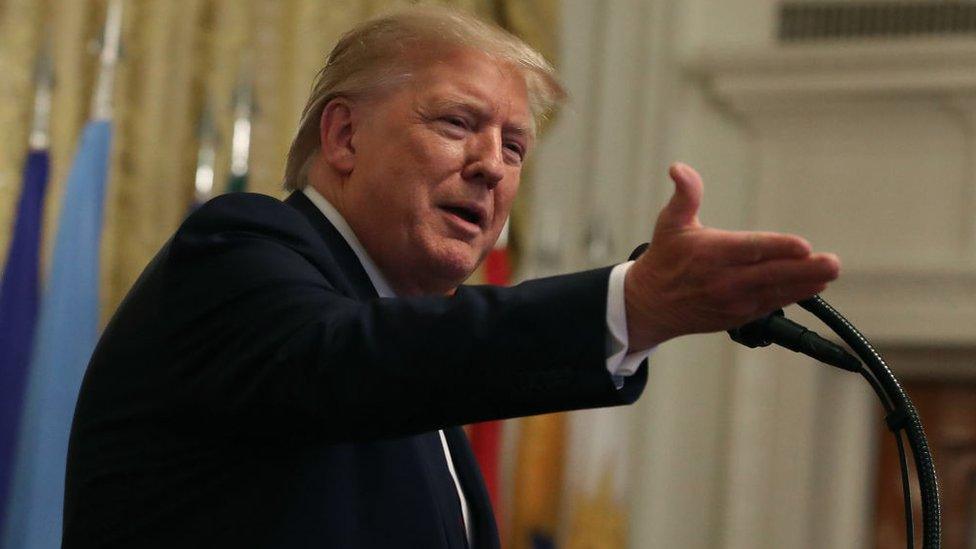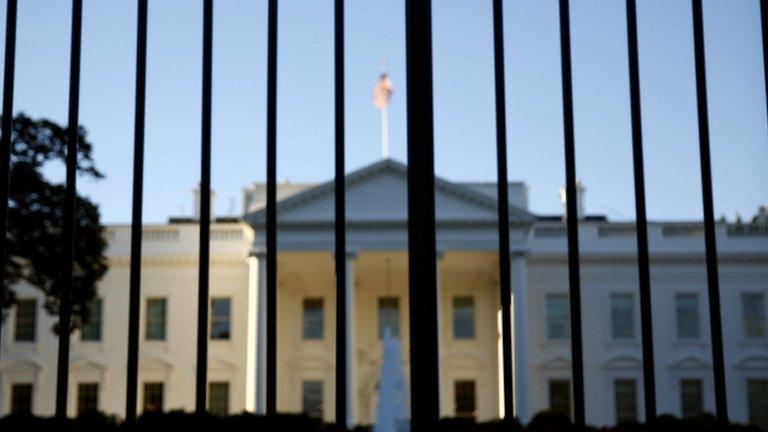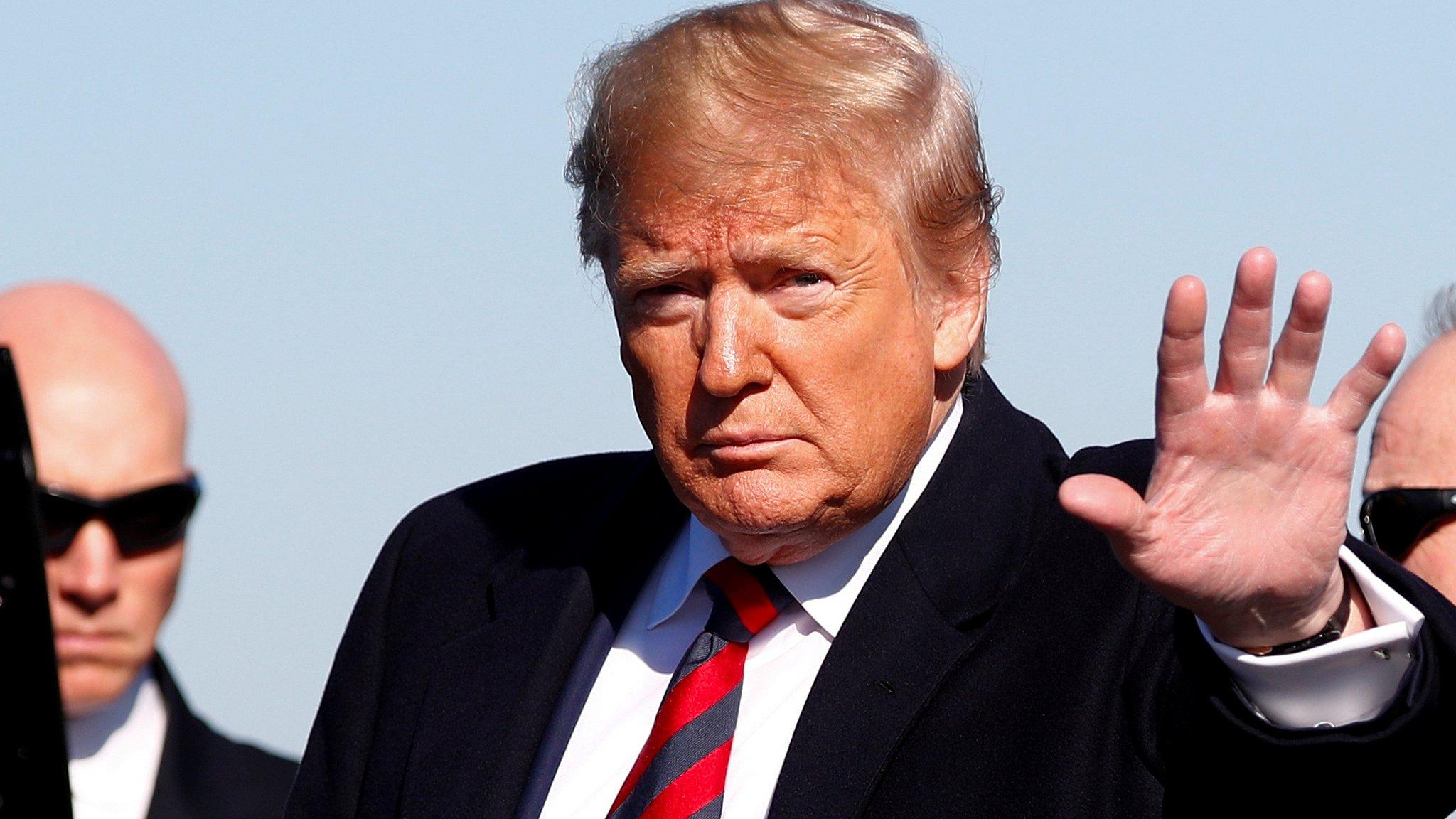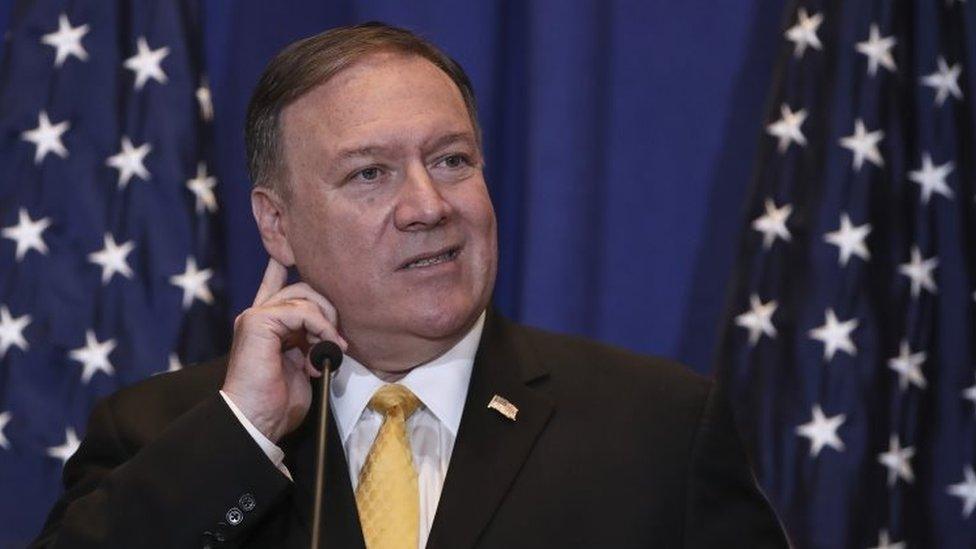Trump impeachment: Whistleblower 'endangered' by Trump criticism
- Published

The US president is accused of pressuring a foreign power for personal gain
The lawyers for a whistleblower whose complaint triggered a US presidential impeachment inquiry say Donald Trump's words are endangering their client.
Since the transcript of his call with the president of Ukraine was revealed, Mr Trump has called for the anonymous whistleblower to be unmasked.
Democrats say the whistleblower will testify to Congress "soon" once steps are taken to protect their identity.
Mr Trump has suggested his opponents could be arrested for treason.
A transcript of a call Mr Trump made to Ukraine's new President Volodymyr Zelensky, external shows he urged him to investigate discredited corruption allegations against former vice-president and 2020 presidential candidate Joe Biden as well as his son.
The call is now at the centre of an effort by Democrats that could see Mr Trump expelled from office, but doing so would require members of his Republican party to turn against him.
What did the lawyers say?
The letter from the whistleblower's legal team - in which the lawyers call attention to Mr Trump's language - was sent to Acting Director of National Intelligence Joseph Maguire on Saturday, and made public on Sunday.
"The events of the past week have heightened our concerns that our client's identity will be disclosed publicly and that, as a result, our client will be put in harm's way," wrote lawyer Andrew Bakaj.
The letter specifically mentions Mr Trump's call last week for the whistleblower to be identified, as well as the person that supplied the whistleblower with information about the call.
It quotes Mr Trump as saying: "I want to know who's the person that gave the whistleblower, who's the person that gave the whistleblower the information, because that's close to a spy.
"You know what we used to do in the old days when we were smart? Right? With spies and treason, right? We used to handle them a little differently than we do now."
Trump impeachment: Was there quid pro quo?
The letter also references a $50,000 (£40,600) "bounty" that two conservative Trump supporters have offered as a "reward" for information about the whistleblower.
"Unfortunately, we expect this situation to worsen, and to become even more dangerous for our client and any other whistleblowers, as Congress seeks to investigate this matter," Mr Bakaj's letter adds.
Mr Maguire faced lawmakers last week and said he believed the whistleblower acted in "good faith".

Quick facts on impeachment
Impeachment is the first part - the charges - of a two-stage political process by which Congress can remove a president from office
If the House of Representatives votes to pass articles of impeachment, the Senate is forced to hold a trial
A Senate vote requires a two-thirds majority to convict - unlikely in this case, given that Mr Trump's party controls the chamber
Only two US presidents in history - Bill Clinton and Andrew Johnson - have been impeached but neither was convicted and removed
President Nixon resigned before he could have been impeached

What has Mr Trump said?
On Sunday evening Mr Trump retweeted a Fox News guest who warned that if Mr Trump is removed from office it will spark "a Civil War like fracture in this Nation from which our Country will never heal".
Illinois Republican Congressman Adam Kinzinger condemned Mr Trump's tweet as "repugnant".
Allow X content?
This article contains content provided by X. We ask for your permission before anything is loaded, as they may be using cookies and other technologies. You may want to read X’s cookie policy, external and privacy policy, external before accepting. To view this content choose ‘accept and continue’.

It came as part of a massive Twitter volley against his critics, in which Mr Trump said he wanted to meet the whistleblower.
"I want to meet not only my accuser... but also the person who illegally gave this information, which was largely incorrect, to the 'Whistleblower.' Was this person SPYING on the US President? Big Consequences!"
On Monday, Mr Trump resumed his Twitter campaign against the whistleblower, as well as Democratic House Intelligence Committee Chairman Adam Schiff who is playing a leading role in the inquiry and has been one of the most vocal critics of the US president.
"I want Schiff questioned at the highest level for Fraud & Treason," wrote Mr Trump.
Over the weekend Republicans began to mount a campaign to defend Mr Trump, however some prominent Republican officials appeared to condemn Mr Trump for this latest scandal.
Tom Bossert, who served as Homeland Security Advisor under Mr Trump, told ABC News: "I'm deeply disturbed by it [the call] as well and this entire mess".

Counter punching carries its own risks

Donald Trump is frequently at his most unfiltered over weekends - and this last one served as evidence in the extreme. Since Saturday morning the president has fired off more than a hundred tweets and retweets, lashing out at Democrats in Congress, the media, his political critics and even conservative Fox News.
The recently announced formal impeachment inquiry has become all-consuming for Mr Trump - and is turning the man who likes to fashion himself as a "counter-puncher" into a whirling frenzy of fists.
The risk for the president is the more he lashes out, the more it reminds the American public of what they see as Mr Trump's greatest flaw. Polls consistently demonstrate a majority of Americans - on the left and the right - disapprove of the president's penchant for social media invective and the apparent lack of discipline it represents.
If a weekend spent on scorched-earth responses mark Mr Trump's impeachment battle plan - with him tweeting the shots from his phone - it may make for a shaky defence and cause growing unease among Republicans who contemplate the challenges of campaigning for re-election under the president's banner in 2020.

What is the impeachment inquiry about?
In a complaint filed last month, a whistleblower from the intelligence community reported his "urgent concern" that the president had used his office to "solicit interference from a foreign country", external in the 2020 US election.
The impeachment inquiry launched on Tuesday now focuses specifically on Mr Trump's call to the Ukrainian president about the Biden allegations.
Democrats accuse Mr Trump of improperly seeking foreign help in the hope of smearing Mr Biden and of using military aid as a bargaining tool.
Ukrainian ex-prosecutor general Yuriy Lutsenko has told the BBC that there was no reason to investigate Mr Biden or his son Hunter Biden, who had worked for a Ukrainian energy firm.
Former prosecutor-general Yuriy Lutsenko speaks to the BBC's Jonah Fisher
Democrats in Congress - which is currently in recess - say they plan to remain in Washington over the break to move "expeditiously" on with impeachment hearings and subpoenas.
Lawmakers say in addition to the whistleblower, they also wish to speak with the president's personal lawyer Rudy Giuliani, who Mr Trump asked the Ukrainian president to co-ordinate with on an inquiry into the Bidens.
- Published28 September 2019

- Published19 December 2019

- Published25 September 2019
- Published28 September 2019
